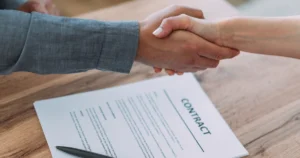 If you were injured by the negligent actions of a government entity, filing a claim for compensation may be more complicated due to sovereign immunity and stricter deadlines. However, it may be possible to hold a government entity liable for an injury, with help from a licensed attorney.
If you were injured by the negligent actions of a government entity, filing a claim for compensation may be more complicated due to sovereign immunity and stricter deadlines. However, it may be possible to hold a government entity liable for an injury, with help from a licensed attorney.
Let our experienced personal injury lawyers in South Bend help you through this complex legal process. Like you, our goal is to secure the maximum compensation you need for medical bills, lost wages and other damages. The consultation is free and there are no fees unless we win.
When Can I File a Claim Against a Government Entity?
Under Indiana’s Tort Claims Against Governmental Entities and Public Employees Act, a government department, agency or employee acting within the scope of his or her employment may be held liable for injuries caused to others in specific situations.
Claims brought against government entities often involve:
- Car accidents involving government-owned vehicles
- Slip and fall accidents in government buildings or areas
There is legal precedent in Indiana that states the government cannot use the defense of sovereign immunity for negligent operation of its vehicles.
You may be able to file a claim against the government for some other situations involving negligence by a government entity if that entity is not exempted by sovereign immunity laws.
When Does Sovereign Immunity Deny Government Liability?
Although there are certain situations when citizens may be able to sue their government, there are more instances when the state may be immune to liability.
Sovereign immunity protections apply to government entities in various situations. Sovereign immunity essentially means that you cannot sue the government without its consent. In the U.S., these laws typically apply to state and federal governments. Indiana state code exempts the government from liability in an extensive list of situations, including:
- Temporary road or property conditions caused by weather
- Condition of unpaved roads, trails and footpaths leading to recreational areas
- Failure to inspect private property
- Highway or roadway design/maintenance, so long as the road is in a “reasonably safe” condition
The full list of exemptions may be found here.
What Are the Rules for Filing a Claim Against the Government?
Although the list of situations providing immunity from liability for government bodies is extensive, it does not entirely strip away a person’s right to seek compensation for damages. However, there are rules governing how these claims are made and how much compensation can be paid out.
For State Claims
A person who suffers an injury due to government negligence must first fill out the form for Notice of Tort Claim for property damage or personal injury with the Attorney General’s office.
Injury victims have 270 days to file a claim for cases involving the state government. If you are successful in bringing your claim and you recover compensation, your damages may be capped at $700,000 for the individual and $5 million for all persons involved.
For Local or Municipal Government
If you suffered an injury or lost a loved one due to the negligent actions of a local or municipal government, Indiana state law still provides you the right to file a claim, but there are stricter rules for doing so than if the issue were with the state government.
For one, injury victims of local or municipal governments only have 180 days to file a Notice of Tort Claim with both the government body being sued and the Indiana political subdivision risk management commission. The claim will be rejected once the 180 days have passed.
Call a Knowledgeable Lawyer Today
Despite sovereign immunity laws in the U.S., accident victims who suffered an injury due to the negligent actions of a government employee or entity still have the legal right to seek compensation under circumstances that are common to personal injury cases, such as car accidents and slip and fall accidents.
Due to the complexities and tight deadlines of filing a claim against the government, it would be in your best interest to speak to an attorney who has knowledge of the law and experience helping injury victims recover compensation.
Call (574) 444-0741 to schedule your free consultation.












